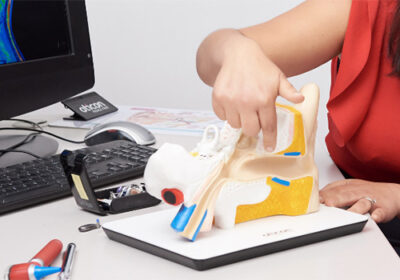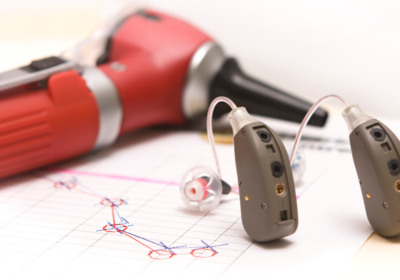
Hearing impairment is a common sensory deficit and often develops with age. Also referred to as presbycusis, age-related hearing loss occurs gradually as people age and makes it difficult for them to follow conversations with family and friends. The inability to hear clearly impacts several aspects of life and may even lead to feelings of isolation. Age-related hearing loss affects both ears and occurs gradually. This often makes it difficult to identify the problem and people may not even realize that they have lost some of their ability to hear.
Causes of Age-related Hearing Loss
A decline in the ability to hear as people age results from various factors. Commonly it occurs due to changes in the inner ear but can also result from changes in the middle ear. Complex changes in the pathways from the ear to the brain may also lead to age-related hearing loss. Moreover, certain medical conditions or medications may cause or aggravate the problem.
How do we hear?
The process of hearing results from the change of sound waves into electrical signals. The signals are then carried by the auditory nerve to the brain through certain complex steps.
- Sound waves after entering the outer ear, move through the ear canal to the eardrum.
- The eardrum vibrates due to the sound waves and transfers the vibrations to the middle ear.
- The sound waves here are then received by the cochlea of the inner ear in the form of fluid vibrations. There exists an elastic partition that runs from the beginning to the end of the cochlea and serves as the base on which the key structures of hearing are located.
- After the vibrations cause the cochlear fluid to ripple, a wave is formed along the partition. The hair cells move up and down and the hair-like projection on top of the hair cells bump and bend. This causes the pore-like channels to open leading to the creation of electrical signals.
- This electrical signal is carried to the brain and we hear it as sound.
Why do we lose our ability to hear as we age?
Several factors contribute to age-related hearing loss. In fact, it can often be difficult to differentiate age-related hearing loss from hearing impairment that results from being exposed to noise over a long period of time.
Noise-induced hearing loss occurs from sounds that are too loud or last for a longer time. This form of noise exposure damages the sensory hair cells in the ear. Since the hair cells do not grow back, the ability of an individual to hear is reduced.
Certain conditions like diabetes or high blood pressure also contribute to hearing loss. Since these conditions are common in older people, their ability to hear is diminished. Some medications also damage the sensory cells in the ears and lead to hearing loss.
In rare cases, age-related hearing loss may be caused by abnormalities in the outer or middle ear. Such abnormalities include a reduction in the functioning of the tympanic membrane or the bones in the middle ear.
In most cases, older people suffer from hearing impairment resulting from a combination of both age-related and noise-induced hearing loss.
Can age-related hearing loss be prevented?
While there are no methods to prevent age-related hearing loss, noise-induced hearing loss can be avoided. By protecting ears from sounds that are too loud or long, you can protect your ability to hear. It is important to be aware of the sources of noise that can damage the ability of an individual to hear like loud music, lawnmowers etc. By avoiding such noises and even reducing the time you are exposed to them, can enable you to protect your ears.
Steps to take if you have hearing concerns
If you notice that your ability to hear has declined, it is important to seek advice as soon as possible to prevent the problem from aggravating further. You may want to visit your physician, otolaryngologist, audiologist and hearing aid specialist. Each of them has a different level of expertise and can be an important part of your hearing care journey.
- An otolaryngologist specializes in the diagnosis and treatment of diseases related to the ears, neck and throat.
- An audiologist in determining and measuring the degree of hearing loss
- A hearing aid specialist can perform hearing tests and suggest the best hearing aids based on your exact needs.
Treatments and Devices that can help
The treatment that will best work for you will depend on the severity of hearing loss. Treatment may work better for you than it does for someone else. This makes it necessary to thoroughly evaluate your hearing loss and accordingly figure out the treatment plan. You can make use of bone-anchored hearing implants, cochlear implants, assistive listening devices or make use of lip-reading method. Hearing aids are also extensively used electronic instruments that can significantly improve the ability of a person to hear. They are placed inside or behind the ears and work by making sounds appear louder.
If you are dealing with a hearing concern and looking for reliable audiologists, visit Active Audiology.
We, at Active Audiology, are an independent clinic and believe in offering unbiased solutions tailored to suit the individual needs of our clients. We understand that hearing concerns and preferences vary and have a complete range of options available. We can suggest hearing aids that best address your hearing problem, suit your lifestyle, budget and are specifically programmed to your needs. If you wish to know more about our hearing aids, feel free to reach out to our team. You can call us on 1300 364 007. We will be happy to assist you.



